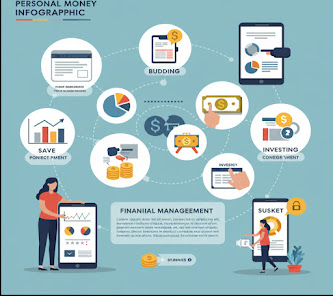**Mastering Personal Money Management: Your Path to Financial Freedom**
*Take Control of Your Finances Today and Build a Secure Tomorrow*
**Introduction**
In a world where financial uncertainties loom large, personal money management isn’t just a skill—it’s a necessity. Whether you’re drowning in debt, struggling to save, or simply aiming to grow your wealth, understanding how to manage your money effectively can transform your life. This guide dives into actionable strategies, tools, and mindset shifts to help you achieve financial stability, reduce stress, and unlock long-term prosperity. Let’s get started!
---
### **Why Personal Money Management Matters**
*The Foundation of Financial Well-Being*
Personal money management is the art of budgeting, saving, investing, and spending wisely to meet both short-term needs and long-term goals. Without a clear plan, even high earners can face financial chaos. Here’s why it matters:
- **Eliminates Financial Stress**: 72% of adults report feeling anxious about money. A solid management plan reduces uncertainty.
- **Builds Wealth**: Consistent saving and investing compound over time.
- **Prepares for Emergencies**: 40% of Americans can’t cover a $400 emergency. Proper planning avoids debt traps.
---
### **1. Start with the Basics: Budgeting**
*Your Blueprint for Financial Success*
A budget is the cornerstone of money management. It’s not about restriction—it’s about empowerment.
**How to Create a Budget**
1. **Track Income & Expenses**: Use apps like *Mint* or *You Need a Budget (YNAB)* to monitor cash flow.
2. **Categorize Spending**: Split expenses into needs (rent, groceries), wants (dining out), and savings/debt repayment.
3. **Set Realistic Goals**: Allocate 20% to savings, 50% to needs, and 30% to wants (the **50/30/20 rule**).
4. **Adjust Regularly**: Life changes—so should your budget.
**Pro Tip**: *Automate bill payments and savings transfers to avoid missed deadlines.*
---
### **2. Saving Strategies That Actually Work**
*From Pennies to Prosperity*
Saving money isn’t just about willpower—it’s about systems.
**Types of Savings to Prioritize**:
- **Emergency Fund**: Aim for 3–6 months of living expenses.
- **Retirement Savings**: Contribute to a 401(k) or IRA; even $100/month adds up.
- **Goal-Based Savings**: Vacation, home down payment, or education.
**Tips to Boost Savings**:
- Automate transfers to savings accounts.
- Cut “invisible” expenses (subscriptions, bank fees).
- Use high-yield savings accounts for better interest rates.
---
### **3. Tackling Debt: Smart Repayment Tactics**
*Break Free from the Debt Cycle*
Debt can derail financial goals, but a strategic approach helps you regain control.
**Effective Debt Repayment Methods**:
- **Debt Snowball**: Pay off smallest debts first for quick wins.
- **Debt Avalanche**: Target high-interest debt (e.g., credit cards) to save on interest.
- **Debt Consolidation**: Combine multiple debts into one lower-interest loan.
**Key Habits to Avoid Debt**:
- Pay more than the minimum due.
- Avoid using credit cards for non-essentials.
- Negotiate lower interest rates with lenders.
---
### **4. Investing for the Future**
*Grow Your Money Wisely*
Investing turns savings into wealth. Start early—time is your greatest ally.
**Beginner-Friendly Investment Options**:
- **Stocks & ETFs**: Long-term growth via platforms like *Robinhood* or *Vanguard*.
- **Retirement Accounts**: Maximize employer-matched 401(k) contributions.
- **Real Estate or REITs**: Diversify with property investments.
**Rule of Thumb**: *Diversify your portfolio to minimize risk.*
---
### **5. Monitor and Adjust Your Plan**
*Stay Agile in Your Financial Journey*
Life changes—job losses, marriages, or new hobbies—require financial plans to adapt.
**Monthly Check-Ins**:
- Review budgets and track progress toward goals.
- Celebrate milestones (e.g., paying off a credit card).
- Rebalance investments annually.
---
### **Tools to Simplify Money Management**
*Tech-Driven Solutions for Modern Finances*
- **Budgeting Apps**: *PocketGuard*, *GoodBudget*.
- **Investment Platforms**: *Betterment*, *Wealthfront*.
- **Credit Monitoring**: *Credit Karma*, *Experian*.
---
### **Final Thoughts: Small Steps, Big Rewards**
Personal money management isn’t about perfection—it’s about progress. Start with one habit: track spending, automate savings, or negotiate a bill. Over time, these steps create a ripple effect toward financial freedom. Remember, the best time to start is **now**.
---
**FAQs: Quick Answers to Common Questions**
- *How do I start managing money with a low income?*
Focus on tiny savings increments and cut non-essential costs. Every dollar counts!
- *What’s the difference between saving and investing?*
Saving preserves money (low risk), while investing grows it (higher risk/reward).
- *How can I handle unexpected expenses?*
Build an emergency fund—even $500 can buffer minor crises.
- *Is a financial advisor worth it?*
For complex goals (taxes, estate planning), yes. For basics, DIY with apps.
---
**Ready to Transform Your Financial Life?**







